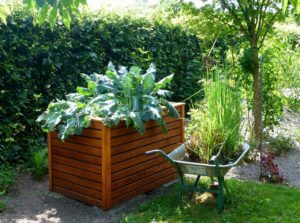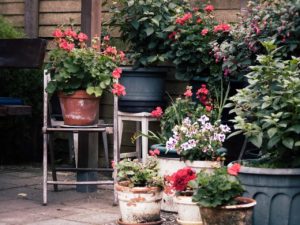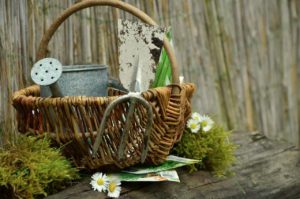
One of the best ways to support both yourself and the planet is to plant a garden! Regardless of how much space you have, your gardening skill level, or your mobility, you can reap the benefits of a garden!
Not sure if gardening is right for you? Consider the following benefits:
Increased dexterity and hand strength – between digging holes, pruning plants and pulling weeds, you will inevitably use your hands in many different ways. This can help to keep your hand muscles both vigorous and agile as you age.
Decreased risk of Alzheimer’s and Dementia – while the causes are not entirely understood, gardening engages all of the senses and provides gardeners with a sense of purpose, which is believed to help slow mental decline. According to one study, daily gardening was shown to reduce the incidence of dementia by 36%!
Increase overall physical health – not only does gardening require physical activity – an obvious benefit to gardeners – but it also typically requires getting outside and getting your hands dirty. Exposing your skin to 10 minutes of direct sunlight (without sunscreen, but not any longer!) each day will provide you with sufficient Vitamin D to greatly reduce your risk of many diseases, including osteoporosis and heart disease. Getting dirt directly on your skin is also suspected to provide benefits in maintaining healthy immune function.
Increase mood and decrease stress – both physical exercise and time spent outdoors are proven to decrease levels of Cortisol, the hormone responsible for stress. Combined with the intrinsic reward of seeing the garden grow as a result of one’s efforts, gardeners are not likely to give up on their gardens as they might with other forms of exercise. For those who prefer not to meditate, gardening can also provide many of the same benefits!
There are many ways to reap the benefits of gardening, despite any physical limitations!
- Consider where you want to garden: Gaining access to one’s yard, especially with a wheelchair or walker, is not always an easy task. Luckily, ramps, outdoor stair lifts, and platform lifts are all affordable options to provide safe access to nearly any outdoor areas! It may also be helpful to lay pavers or have a concrete pathway added to create a level surface leading from the home to the garden. Perhaps your yard is not right for gardening, or you live in an apartment? You can easily create small gardens in planter boxes on your deck or patio, or even keep smaller potted plants on a windowsill inside!
 Consider your specific physical abilities: Having a garden does not have to require large amounts of kneeling or bending down. Smaller gardens can be hung in baskets or placed on tables at a comfortable height. If you are interested in a raised garden bed, they can be created at a comfortable height that can be reached from a chair or wheelchair. If you will be sitting down while tending your garden, consider how far you can reach, and be sure to keep your plants within a comfortable range and your garden bed narrow enough so you are not straining to tend to your plants. Follow this link for a video from “This Old House” showing how one landscape contractor builds an accessible raised garden bed from start to finish.
Consider your specific physical abilities: Having a garden does not have to require large amounts of kneeling or bending down. Smaller gardens can be hung in baskets or placed on tables at a comfortable height. If you are interested in a raised garden bed, they can be created at a comfortable height that can be reached from a chair or wheelchair. If you will be sitting down while tending your garden, consider how far you can reach, and be sure to keep your plants within a comfortable range and your garden bed narrow enough so you are not straining to tend to your plants. Follow this link for a video from “This Old House” showing how one landscape contractor builds an accessible raised garden bed from start to finish.- Consider your strength and dexterity: according to the Christopher Reeve Foundation, long-handled tools are ideal for those with limited hand and arm movement. You can also use softer, light-weight soil that reduces the amount of strength needed to dig and plant in your garden. A variety of specialized tools and equipment are available that can help you make the most of your garden – check out this equipment and tool finder from Thrive for details!
 Consider what you want to plant: perennial, annual, flowering, edible, full-sun, drought-resistant… when it comes to variety, there is no shortage of plants! If you are planting outdoors, look into your hardiness zone or talk to someone at a local garden store to determine which plants will work in your region. You will also want to assess how much sunlight your garden receives, as well as other factors such as: how much space the plants will need once they are fully grown, water requirements, and maintenance requirements. Use this handy checklist from HGTV to determine what you are looking for in your garden, then discuss with your landscaper or local garden center expert to select the best plants for you!
Consider what you want to plant: perennial, annual, flowering, edible, full-sun, drought-resistant… when it comes to variety, there is no shortage of plants! If you are planting outdoors, look into your hardiness zone or talk to someone at a local garden store to determine which plants will work in your region. You will also want to assess how much sunlight your garden receives, as well as other factors such as: how much space the plants will need once they are fully grown, water requirements, and maintenance requirements. Use this handy checklist from HGTV to determine what you are looking for in your garden, then discuss with your landscaper or local garden center expert to select the best plants for you!- Consider asking for help: the initial stages of getting your planters or raised garden beds in place and full of soil can be laborious, so don’t be afraid to ask for help from a family member or neighbor, or work with a trusted landscaper!
Still unsure? Consider this simple DIY for a small, raised herb garden. Many herbs are hardy, smell nice, and can be used in cooking or for teas, making them that much more rewarding to grow!

